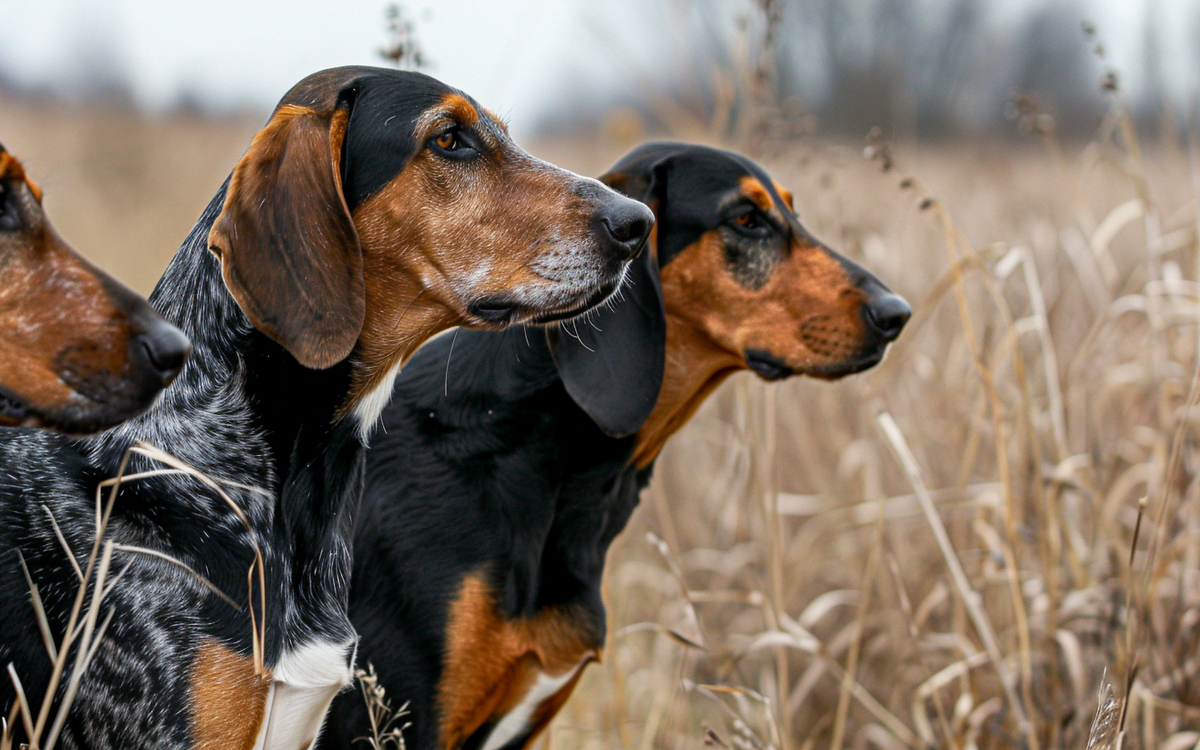Coonhounds are exceptional companions to welcome into your home. Renowned for their remarkable athleticism, they excel in raccoon hunting, showcasing their natural prowess. These dogs are not only intelligent and energetic but also cooperative, agile, and universally friendly, making them excellent around children. However, their distinctive baying is also a well-known trait. With various breeds of Coonhounds available, you have the flexibility to select the dog that best fits your lifestyle and needs.
Introduction
You know that feeling when a dog’s nose suddenly perks up, and their whole body snaps to attention? They might tilt their head ever so slightly to pinpoint the source of a smell you can’t even begin to register. Coonhounds take that extraordinary sense of smell to another level! These remarkable dogs were born and bred to track down critters under the cover of darkness, and let me tell you, their noses know what they’re doing.
Coonhounds, you see, are a special group of scent hounds. They were developed right here in the United States to track and tree raccoons primarily, but their incredible sniffing skills mean they can be put to work on all sorts of trailing jobs. Imagine them proudly hot on the trail of a bear, a bobcat, or even a missing person!
If you’re the kind of person who’s fascinated by dogs and their amazing abilities, or you’re considering bringing one of these floppy-eared, sweet-natured pups into your life, then you’re in the right place. Let’s dive into the world of Coonhounds!
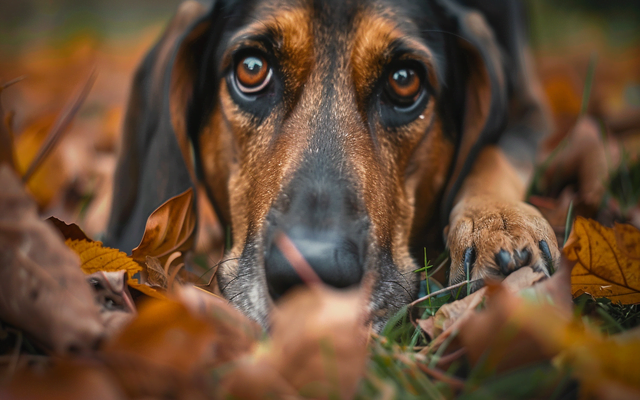
Understanding the Coonhound
Evolution of a Hunter
The story of Coonhounds is deeply woven into the fabric of American history. Settlers arriving in the New World needed tough, determined dogs to help them find food and protect their homesteads. By carefully breeding various European hound types, they created dogs specifically built for the rugged terrain and nocturnal wildlife of North America.
Did you know there’s even a timeline of how Coonhound breeds developed? Yep, a whole visual breakdown of how their ancestors came together to create the dogs we know and love today. It’s pretty neat to see how traits like those gorgeous floppy ears and the legendary baying voice came about.
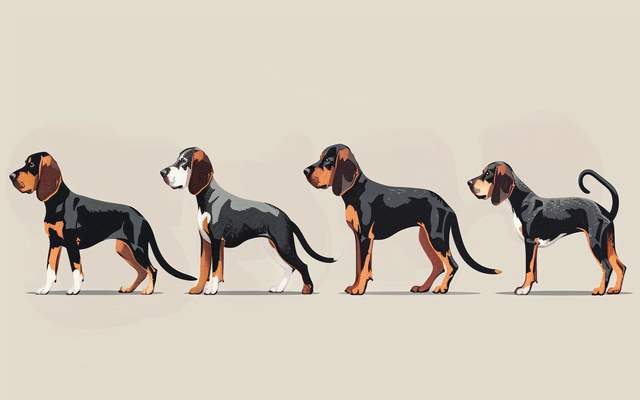
The Power of Scent
A Coonhound’s nose is its superpower! These dogs can follow a scent trail that’s been sitting cold for hours, maybe even days. How do they do it? Well, for starters, they have a LOT more scent receptors than us humans – we’re talking millions more. Then, there’s the way their long, floppy ears drag along the ground, stirring up scent particles for their nose to catch a whiff.
But it’s not just about the nose itself. Coonhounds have brains that are basically wired for processing smells. It kind of blows your mind when you think about it!
The Coonhound Voice
If you’ve never heard a Coonhound in full voice, prepare to be impressed…and maybe cover your ears a little, too! These dogs are known for their loud, distinctive baying – it’s how they communicate with their handlers out on the hunt. There are even different types of bays: a howl when they pick up a scent trail, a choppy bark when they’ve cornered their quarry, and a joyful bugle-like sound when they’ve actually treed the animal.
Imagine hearing that echoing through the woods! It’s a sound that’s truly unforgettable.
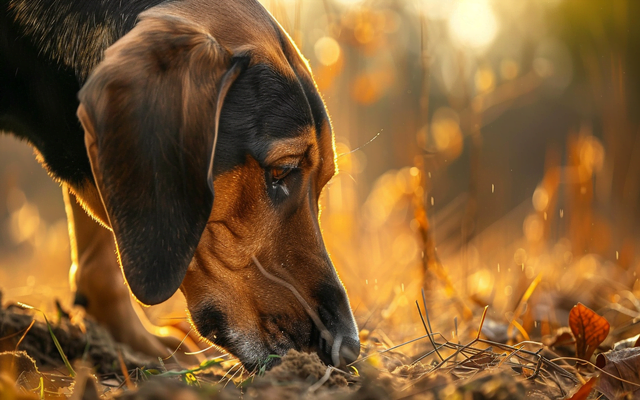
The Coonhound Breeds: A Detailed Look
While all Coonhounds share some core traits, there are distinct differences between the individual breeds that are recognized by the American Kennel Club (AKC). Plus, there’s that other amazing hound, the Plott Hound. While not officially AKC-recognized, they’ve got just as much heart and history as their cousins!
American English Coonhound
- The Classic: American English Coonhounds are often the picture you have in your mind when you think “Coonhound.” Their red and white ticked fur makes them stand out in the woods.
- Speedy and Determined: These are energetic pups, always ready for the next trail, and they don’t give up easily!
- Friendly Faces: With their sweet expressions and easygoing natures, they make wonderful family dogs.
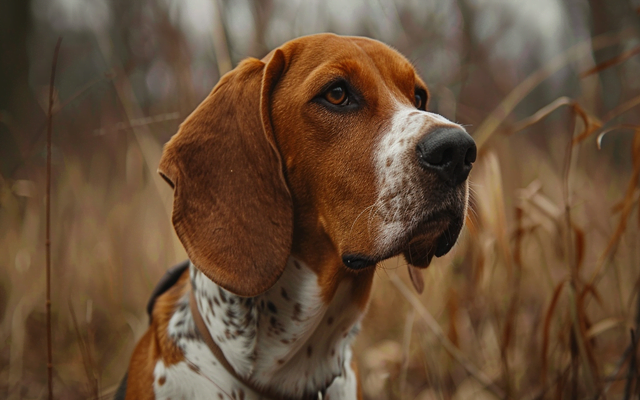
Black and Tan Coonhound
- Shadow Hunters: Picture a sleek dog with a jet-black coat and those classic tan markings above their eyes and on their paws. They’re striking for sure!
- Powerful and Tireless: They’ve got the stamina and focus to follow a scent trail for miles.
- Gentle Giants: Despite their tracking prowess, these are big softies at heart, loving and loyal pets.
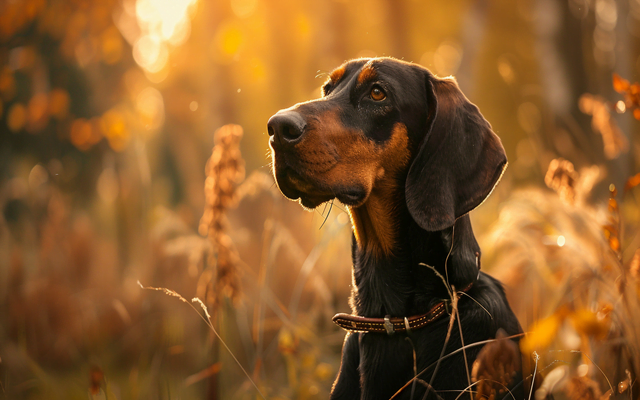
Bluetick Coonhound
- Beautiful Blues: Their coats are a gorgeous mix of dark blue and black, with a mottled ‘ticked’ pattern that’s unique to each dog.
- The Famous Voice: If you had to pick one breed to exemplify the classic Coonhound bay, Blueticks would be a top contender!
- Mellow Souls: They’re known for being a bit more laid-back than some other Coonhounds, while still having that true hound spirit.
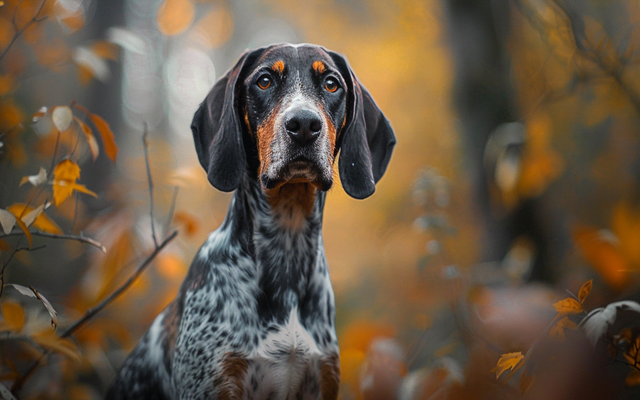
Treeing Walker Coonhound
- Fast Thinkers: If you think Coonhounds are impressive, Treeing Walkers take it up a notch! They’re known for their quick wits and their ability to independently follow a scent trail.
- Colorful Coats: These pups come in a variety of colors and patterns, including tri-color and bi-color variations.
- Up for Anything: Treeing Walkers are true hunting dogs, but also excel in agility sports and make playful companions.
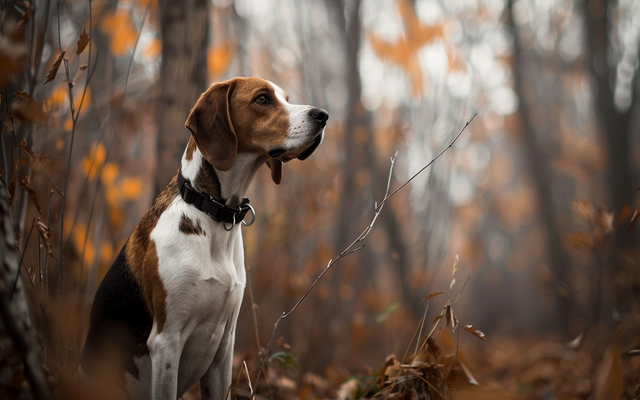
Redbone Coonhound
- Fiery Spirits: Their solid red coats definitely stand out! Just like their coat color, they’ve got a bold and enthusiastic personality.
- All-Around Athletes: Redbones are versatile hounds, suited for all kinds of hunting and outdoor activities.
- Sweet and Silly: They’ve got a gentle heart and a playful side that make them irresistible family pets.
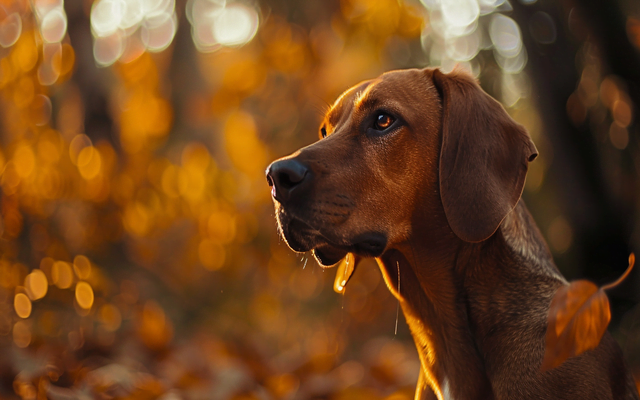
Plott Hound
The Mountain Dog: Hailing from the mountains of North Carolina, Plotts are famed for their bravery and tenacity on the hunting trail – especially when it comes to big game like bears!
- Brindle Beauties: Their short coats come in a variety of brindle patterns, making each dog unique.
- Independent Thinkers: Plotts are intelligent and have a strong sense of purpose, requiring an owner who understands their drive
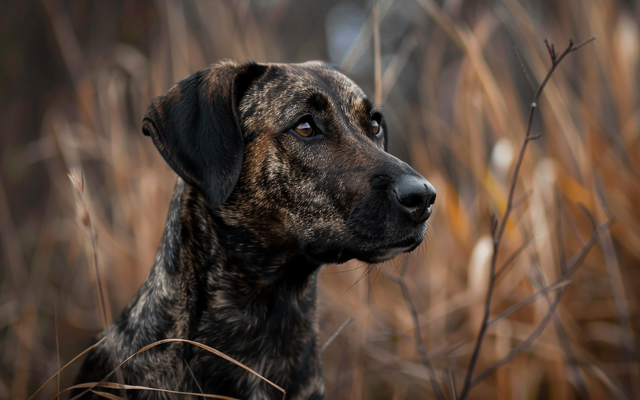
Life with a Coonhound
Ideal Match
Coonhounds aren’t for everyone – and that’s okay! They’re incredible dogs, but they also come with specific needs. So, what makes the ideal Coonhound owner? Here’s the kind of person (or family) these dogs tend to thrive with:
- Adventure Lover: If you’re always up for hikes, camping trips, and exploring the outdoors, you and a Coonhound could be a perfect match!
- Active Lifestyle: Unless you’re a dedicated runner, daily walks aren’t going to cut it for most Coonhounds. They need lots of vigorous exercise to stay happy and healthy.
- Experienced Dog Owner: Coonhounds are smart but can also be stubborn. They’ll do best with someone who knows how to train with patience and positive reinforcement.
- A Bit of Country: Coonhounds love to follow their noses, so a fenced-in yard is a huge plus. Apartments without easy access to the outdoors can be tough.
- Can Handle the Volume: Let’s be honest, baying is loud! There are ways to manage it, but you’ve got to have a tolerance for hound dog vocalizations.
Training and Enrichment
Coonhounds are clever dogs, but they’ve also got a mind of their own! Training is a must, and it’s best to start early. Here’s the good news: these dogs are highly food motivated, which makes things easier.
- Positive Reinforcement Rules: These pups do best with training that’s focused on rewards for good behavior and patience for those inevitable hound dog distractions.
- Follow the Nose: Play up those natural instincts! Games like scent tracking and puzzle toys can mentally tire out your Coonhound as much as a long run.
- Socialization is Key: They need exposure to other people, dogs, and different situations to be well-rounded pups.
Exercise Regimen
Imagine the Energizer Bunny, but in dog form. That’s the energy level we’re talking about with many Coonhounds! Here’s what you need to provide to keep them happy and well-adjusted:
- Daily Dose: Think multiple long walks or runs combined with playtime, ideally with some off-leash time in a secure area where they can safely sniff and explore.
- Variety is Spice: Hiking, swimming, and dog sports like agility are fantastic ways to mix things up and keep your Coonhound entertained.
- A Bored Coonhound is a Mischievous Coonhound: If they don’t get enough exercise, they’ll find their own entertainment – and that might mean chewing your shoes or serenading the neighborhood at 3 AM.
Addressing Challenges
Coonhounds bring so much joy, but it’s important to be upfront about the potential challenges too! Here are some things that prospective owners should be prepared for:
- The Nose Knows: These pups are easily distracted by scents and have a serious prey drive. That squirrel in the yard is more interesting than listening to you!
- Vocal Virtuosos: Baying? Check. Howling? You bet. While training can help manage the volume, some level of noise is just part of living with a Coonhound.
- Stubborn Streak: While sweet-natured, Coonhounds definitely have an independent side. You’ll need patience and consistency when training.
Bringing a Coonhound Home Responsibly
Finding a Breeder
A responsible breeder prioritizes the health and wellbeing of their dogs, and that translates into happy, well-adjusted puppies. Here’s what to look for:
- Health is #1: They should conduct thorough health testing on the parents to minimize the risk of breed-specific issues.
- Puppy Love: Pups should be raised in a loving home environment, getting early socialization that sets them up for success.
- Ask Away!: A good breeder will be enthusiastic about answering your questions and just as interested in you as a potential owner as you are in them.
- Red Flags: Avoid breeders who always have puppies available, sell through pet stores, or won’t let you meet the parents.
Rescue and Adoption
Opening your heart and home to a rescue Coonhound is incredibly rewarding! Coonhound-specific rescue groups can help you find the perfect match, even if it’s not a purebred dog.
Living Legend: The Coonhound’s Legacy
Beyond Hunting
Coonhounds might have been bred for hunting, but their intelligence, work ethic, and lovable personalities have made them stars in many other fields…if you can convince them to put those noses down for long enough!
- Search and Rescue Warriors: Coonhounds’ incredible tracking abilities make them valuable assets for search and rescue teams, finding missing people in challenging terrain.
- Conservation Heroes: Some Coonhounds are put to work tracking and managing wildlife populations, even assisting with the detection of invasive species.
- Therapy All-Stars: Their gentle nature and love of people make them wonderful therapy dogs, bringing smiles to people in hospitals and care homes.
- Family Companions: More and more Coonhounds are proving that, with the right training and home environment, they can be fantastic (and hilarious) family pets.
A Unique Bond
Sharing your life with a Coonhound is a truly special experience. These are dogs who were meant to work closely with humans, and that bond runs deep. It’s a partnership built on understanding their instincts, respecting their unique needs, and appreciating those big, goofy personalities that make them so irresistible.
Conclusion
If you’re looking for a dog who’s up for anything, got a nose that could rival a detective, and a heart as big as the outdoors, then a Coonhound just might be your perfect match. They’re a reminder of the incredible connection between humans and dogs, a testament to what can happen when you breed them for a specific purpose over generations.
Owning a Coonhound isn’t always a walk in the park. Their booming voices and independent spirits come with the territory! But if you’re ready for the adventure, the rewards are more than worth it. There’s a reason these legendary dogs have captured hearts for centuries.
FAQs
Are Coonhounds good with children?
Coonhounds are typically known for their gentle and friendly natures, which can make them good companions for kids. However, it’s crucial to remember that every dog is an individual. Supervise interactions between Coonhounds and children, especially young ones. Teach children how to approach and interact with dogs respectfully. Their larger size might accidentally knock over little ones, and their booming baying could also be startling.
Do Coonhounds shed a lot?
Coonhounds have short, dense coats, which means they do shed, but moderately compared to some other breeds. Regular brushing helps control shedding and keeps their coats healthy. Be prepared for some dog hair around the house, especially during seasonal shedding periods.
Can Coonhounds live in apartments?
Apartment living can be challenging for Coonhounds. They have a strong need for physical exercise and mental stimulation, which may be difficult to provide in small spaces. Additionally, their loud baying can be disruptive to neighbors. If considering an apartment, be prepared for multiple long walks or runs daily along with dedicated training to manage barking.
Can Coonhounds live with cats or other small animals?
Due to their strong prey drive, Coonhounds may not be suitable for homes with cats or other small pets. It’s possible to introduce them carefully and train them, but this takes significant effort and might not be successful. It’s best to be honest about their instinct to chase anything that moves quickly!
How do I train a Coonhound to come back when called (recall training)?
Recall training is essential for Coonhounds, who are easily distracted by scents and prone to wandering. Start training early in a controlled environment like a securely fenced yard. Use high-value treats and lots of positive reinforcement. Be patient and consistent, as it might take longer to teach a Coonhound reliable recall than with some other breeds.
Are Coonhounds prone to any specific health problems?
Like all breeds, Coonhounds can be susceptible to certain health issues. Some common ones to be aware of include:
- Hip Dysplasia: A deformity of the hip joints that can lead to pain and arthritis.
- Ear Infections: Their floppy ears can trap moisture, leading to bacterial or yeast infections.
- Bloat: A life-threatening condition where the stomach fills with gas and twists.
Responsible breeders screen for these conditions to create healthier dogs. It’s crucial to ask about health testing and get veterinary checkups for your Coonhound throughout their life.
Do Coonhounds do well in competitions like agility or dog shows?
While Coonhounds were originally bred for hunting, they are versatile dogs who can excel in various activities. They have the athleticism and intelligence to do well in agility trials with proper training. Some Coonhounds also participate in dog shows, though not as commonly as their field work.
What’s it like to live with a senior Coonhound?
Older Coonhounds transition into wonderful companions. They tend to have calmer energy levels and become even more affectionate. While they may need more frequent vet visits and adjustments to their diet and exercise routine, they offer unwavering love and loyalty. Consider adopting a senior Coonhound – they often get overlooked in shelters but have so much love to give.
How much do Coonhound puppies cost?
The cost of Coonhound puppies can vary depending on the breeder, bloodlines, and location. Expect to pay somewhere between $500 and $1500 or potentially more for a puppy from a reputable breeder. Always prioritize the breeder’s focus on health and temperament over the cheapest price. Rescues or shelters might have Coonhounds or Coonhound mixes available for adoption at a lower cost.

I could talk about dog breeds all day! My goal is to help you find the four-legged friend who fits your life like a perfectly worn-in tennis ball fits in a dog’s mouth.

